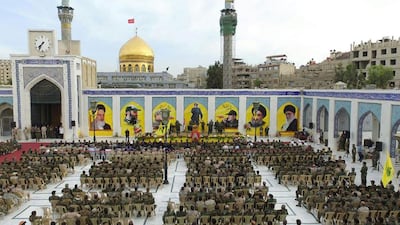Live updates: Follow the latest news on Israel-Gaza
An Israeli air strike in Syria killed two members of Iran's Islamic Revolutionary Guard Corps, Tehran announced, in the first known death of Iranian military personnel abroad since the Israel-Gaza war started almost two months ago.
Iranian state TV channel Al Alam quoted the IRGC as saying that Mohammad Ali Horjah and Bina Taqi Zadeh “were martyred on the hands of the Zionist enemy” on Saturday.
The strike was the first Israeli attack on targets in Syria since the expiry of the temporary truce between Israel and Hamas on Saturday.
Israel has accelerated its air raids on Iranian installations and supply lines in Syria since the October 7 war with Hamas, a militant group linked to the Muslim Brotherhood that has become more influenced by Iran in the last decade.
Since the war broke out, air strikes have hit Damascus and Aleppo airports, as well as targets linked to Hezbollah, the Lebanese militant group backed by Syrian President Bashar Al Assad and allied with Hamas against Israel.
The two men killed in Syria were “performing a consultative mission on the Islamic resistance front”, the Iranian channel said.
Sources from the Syrian opposition movement based in Amman said that the Israeli strikes on Saturday, carried out by F-16 warplanes, were aimed at an Iranian compound housing command and control, as well as weapons storage centres.
The compound is located in the Adlieh farms areas, near the Saydah Zeinab district, situated on the southern edge of Damascus, they said, adding that two Hezbollah fighters are believed to have been also killed.
The IRGC is in charge of ties with Iran's militia allies abroad, as well guarding the ideological tenants of the 1979 revolution, which brought Shiite theologians to the helm of power in Iran.
The organisation had threatened that its militia allies would be launching multipronged, sustained operations against Israel in support of Hamas, in a so called “unity of fronts” war of retribution.
However, a full-scale regional war on multiple fronts has not materialised, and has instead been limited to cross-border fighting between Hezbollah and Israel, and several attempts to strike Israel by the Iran-backed Houthis from Yemen.
In Syria, IRGC commanders supervise most of the militia groups who played a crucial role, along with Russia, in enabling President Bashar Al Assad to survive the 2011 revolt against his rule and later recapture swathes of Syria that had fallen to the Sunni rebels.
Protecting a Shiite shrine in Sayda Zeinab was the initial justification for the 2011-2012 entry of the Shiite guerrilla group Hezbollah into Syria. An array of coreligionist militias from Iraq, Afghanistan, and Pakistan followed as Sunni militants started taking over the armed movement against the regime.
The Adlieh farms is a juncture between Iran's supply route from the Syrian desert and Lebanon, the sources said. It is also situated eight kilometres from Damascus airport, which has been increasingly raided by Israel since the Gaza war, because of its perceived role in the Iranian supply chain.
One of the sources in Amman said that the compound where the two IRGC members were killed is surrounded by Syrian army installations, particularly on the road to the governorate of Suweida, to the south.
Barren lands act as a buffer between the compound and the urban concentrations on the edge of Damascus.
“The IRGC has been taking over or buying disused farms and other property near the airport road over the past decade,” the source said.
Damascus airport has been struck at least three times since Israel launched a full-scale air and land campaign on Gaza in response to Hamas's attack on Israel on October 7.
The airport, which lies on the south-eastern edge of the capital, took the latest hit from missiles on Sunday, among other targets around the city, forcing it again to halt operations, according to official media.


